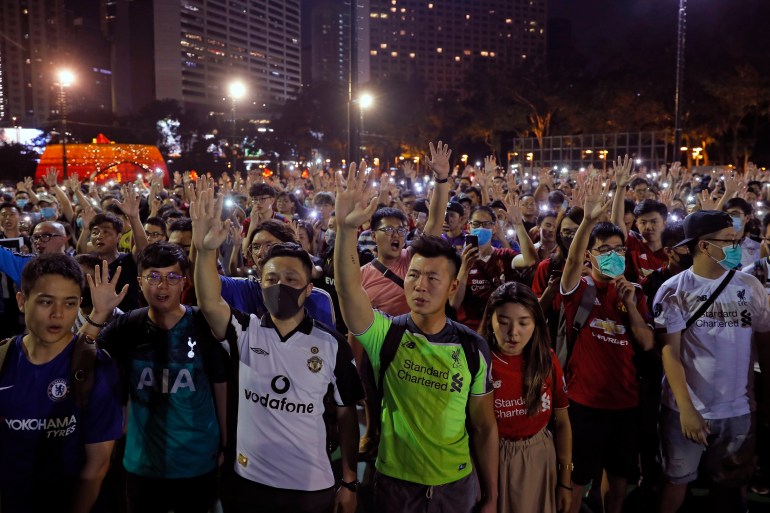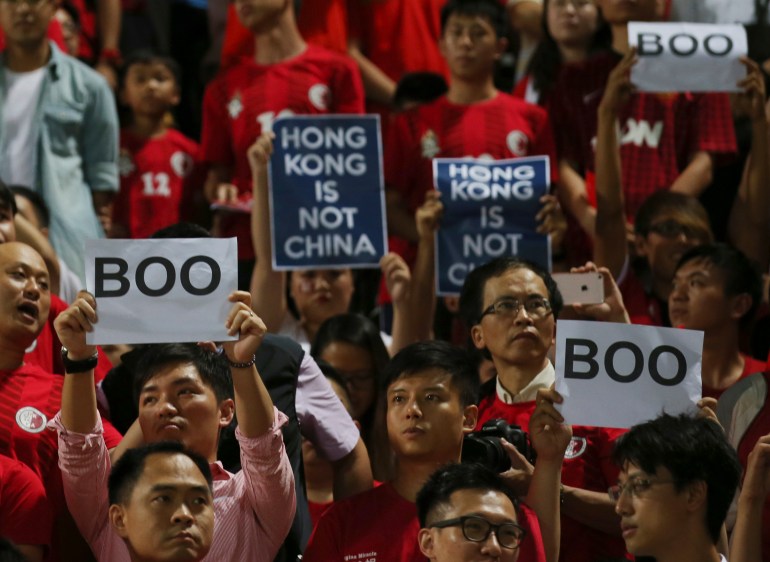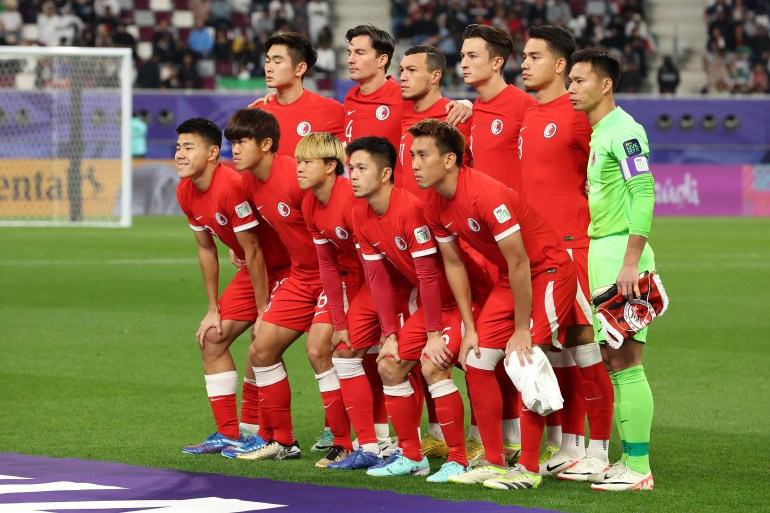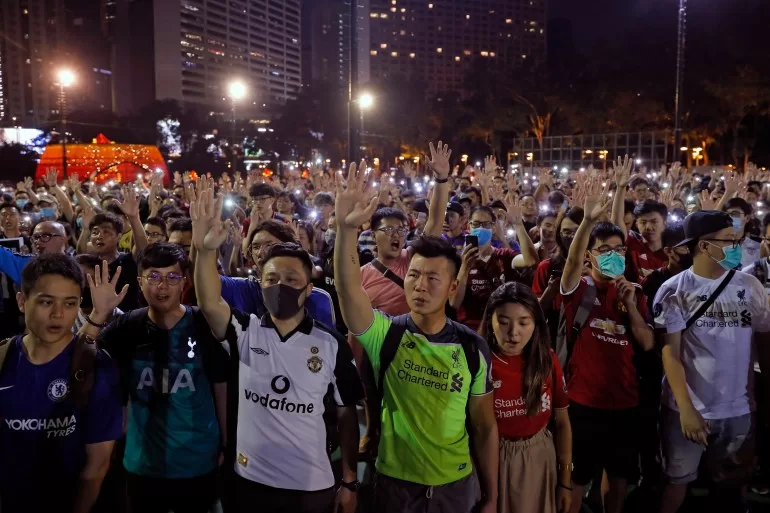At the time, Law was perhaps the highest-profile pro-democracy activist in Hong Kong. He had come to prominence as one of the student leaders of the 2014 Umbrella Movement, moving against plans to allow Beijing to veto political candidates to run Hong Kong.
He later co-founded a new political party and became Hong Kong’s youngest elected lawmaker, although he was later disqualified from office alongside other pro-democracy politicians, on the nebulous charge of not taking the oath of office properly.
But when the unrest returned in 2019, and as the streets again filled with protesters, another more unusual crucible for resistance came to the fore: the football stadium.
When the Hong Kong national football team played, the discontent from the streets was projected louder than anywhere else. Supporters would boo the Chinese national anthem, which was played on behalf of Hong Kong as it is officially a “Special Administrative Region” of China.
Instead, supporters would sing, Glory to Hong Kong, an alternative song associated with the protest movement.
“The football culture of Hong Kong is for people to support the national team in ways to show discontent towards the government, so when there was a Chinese national anthem playing, people would stand up and show discontent by just booing them,” said Law, who is a football fan as well as an activist.
In Hong Kong, where there has been a return to the politics of local identity – particularly the uniqueness of Hong Kong identity – support for the national team is also strong, he said. “There’s a correlation between sports and politics. Because at the end of the day, if you are trying to create a unique people, you need to have this identity, you need myth, you need something to cement them … the national team is part of the nation-building process.”
But there was no booing on Tuesday night in Doha when the Hong Kong team played Palestine in a crunch match to reach the knockout stages of the 2024 Asian Cup.
Palestine won 3-0, ending Hong Kong’s involvement in the tournament, but this was a very different national team, and political environment, compared with 2019. For one, the team now officially plays under a different name: Hong Kong, China.

‘Anti-foreigner’ riots
When Hong Kong was handed back to China by the British in 1997, at the end of a 99-year lease, there was unease about what the future had in store. China promised to maintain Hong Kong’s status as a “Special Administrative Region” for the next 50 years as long as Hong Kong was irrevocably recognised as Chinese territory, under the “one country, two systems” model.
The result was an uneasy tension between the more pluralistic and liberal democratic system of Hong Kong, and the far more authoritarian model practised on the mainland. It was a tension that became unavoidably public when the two national football teams faced each other in competition.
By far the most infamous match was the “5.19 Incident”, so called because it happened at a crucial World Cup qualifier between Hong Kong and China for Mexico ’86 on May 19, 1985.
Hong Kong was still a British colonial possession that flew its colonial-era flag and used “God Save the Queen” as its anthem when its team beat China 2-1 in front of 80,000 fans at the Worker’s Stadium in Beijing.
“Anti-foreigner” riots erupted, preventing Hong Kong’s players from leaving the stadium for two hours.
“HK Win Sparks Riot: Angry Crowds Stone Foreigners,” ran one headline in the South China Morning Post. “Half bricks and broken bottles” rained down on the pitch, they wrote.
The Chinese team bus and a Japanese-made taxi were overturned outside the stadium. A further 130 vehicles were destroyed. Such was the shame of losing to Hong Kong that both China’s coach and the FA president resigned. It was dubbed the “Siege of the Workers’ Stadium”.
Law hadn’t been born yet and was only a baby when Hong Kong beat China on penalties in a regional tournament in 1995, another famous but rare victory for Hong Kong over China. Yet he grew up with football and saw its political power grow in Hong Kong, especially when it came to the issue of the national anthem.
Since 1997, China’s The March of The Volunteers has been Hong Kong’s official anthem, too. When the two teams were drawn again in the same group for the 2018 World Cup qualification and played twice in 2015, Hong Kong’s fans booed their own anthem.
A large number turned their backs to the field when it was sung and held up banners that said “Hong Kong is NOT China” and “Boo”. Both games finished as diplomatic 0-0 draws and the Hong Kong Football Association was later sanctioned by FIFA.

Still booing the National Anthem
To prevent a repeat, Hong Kong introduced the National Anthem Ordinance in June 2020. This stated that everyone must stand and “deport themselves with dignity” when The March of Volunteers was played at major events, especially sporting events. Intentionally insulting the anthem now carried a three-year jail sentence and a $6,000 fine.
Even that didn’t stop some of the crowd from booing the national anthem when Hong Kong played Myanmar as late as last year, however.
The new ordinance wasn’t enough and, at the start of 2023, the Sports Federation and Olympic Committee of Hong Kong, China, ordered Hong Kong’s 83 sporting bodies to change their names to include “China” or lose their funding.
The newly named “Hong Kong Football Association, China” duly complied and the newly named national team, Hong Kong, China, was born. “Every organised national sports team in Hong Kong has to change its name from Hong Kong to Hong Kong, China, in order to show political loyalty,” explained Law.
“A lot of people – diehard fans of the Hong Kong national team – were really complaining and expressing their discontent online because that [the national team] was a big part of Hong Kong’s unique identity.”
But with the avenues for dissent growing narrower under Hong Kong’s post-protest security regime, and the threat of jail hanging over them, few fans could speak out. The stadiums were silenced. Or almost silenced.
In March 2023, thousands queued up outside the Mong Kok stadium in Kowloon to watch the last game that the Hong Kong national team would officially play under that name.
The thousands who arrived at the Mong Kok stadium weren’t just there for an historic final moment. They had also arrived to buy the last ever Hong Kong jersey to be released before its name was to change forever. “People were so upset about it [the name and jersey change],” recalled Law. “So people just tried to catch the last window, and buy the last version of the jersey.”
The jerseys sold out within an hour. “Even I couldn’t get one!” Law said.

A friendly but symbolic win against China
Under Norwegian coach Jorn Andersen, who has experience operating in politically sensitive environments after coaching the North Korean national team, Hong Kong reached its first Asian Cup finals since 1968. Chan Siu-kwan’s goal against the UAE in their first game of this year’s tournament was Hong Kong’s first in the Asian Cup in 56 years.
“It is still a bit difficult to properly evaluate how much the Hong Kong team improved over the last years [but] there was definitely a certain upwards momentum after Jorn Andersen took over in 2021,” said Tobias Zuser, an academic and co-host of the Hong Kong Football Podcast.
“Hong Kong benefitted from the recent Asian Cup expansion from 16 to 24 teams. Having qualified as the 24th team, there is still a general perception that they have been losing ground to the likes of Vietnam and, as such, future qualifications to the Asian Cup will still be a major challenge.”
Zuser believed Andersen has brought in a more proactive style, using younger players alongside naturalised foreigners, which has brought results.
Symbolically, Hong Kong beat China 2-1 in a behind-closed-doors friendly in Abu Dhabi before the tournament began, their first victory over China in 28 years.
“I don’t have to motivate the team against China,” Andersen said after the victory.
“[The win against China] was certainly a symbolic victory,” said Zuser. “But compared to the latest two wins, 1985 in the World Cup qualifiers and 1995 in penalties at the predecessor of the East Asian Cup, it was only a friendly game and hence of considerably less historical weight.”
Law said he noticed a more subdued official reaction to the win.
“There were no Hong Kong officials coming out to congratulate the Hong Kong team, no one said anything after Hong Kong’s victory against China,” he said. “If Hong Kong had beaten Japan or Korea, government officials would say ‘Look how well we played.’ Not this time.”
Law still followed the results of the national team, but from afar. He fled Hong Kong in 2021 after its new security law was implemented. He has since been given political asylum in the UK. In July last year, the Hong Kong authorities issued an arrest warrant for Law and offered a bounty of one million Hong Kong dollars ($129,000) for his capture.
The national team lost its first two games against Iran and the UAE. When Palestine beat Hong Kong, a victory which confirmed both Hong Kong and China’s elimination from the competition, Law tweeted magnanimously, “I hope this news brings some warmth to the people who suffered a lot. We need peace and rights.”
A new convergence
Jorn Andersen is likely to stay with the Hong Kong team as they prepare for their next challenge, a round of 2026 World Cup qualification matches in March.
Although they lost all three games at the Asian Cup, the fans were positive about the performances, especially against the UAE and Iran. “It was very important we could beat China [before the tournament],” said Andersen after the Palestine game. “That has given us confidence. Overall, we had a good tournament, we took a step up and closed the gap to the bigger teams. We have to work hard, and close the gap a bit more.”
This year’s Asian Cup, and Hong Kong’s friendly victory in Abu Dhabi, showed that the gap between Hong Kong, China and the Republic of China, in footballing terms at least, has got smaller.
It is one convergence that the mainland perhaps wasn’t expecting to see. “Whenever Hong Kong, a quote-unquote ‘province team’, performs well and outperforms China, it is bad news for them,” said Law. “And it’s good news for us.”
